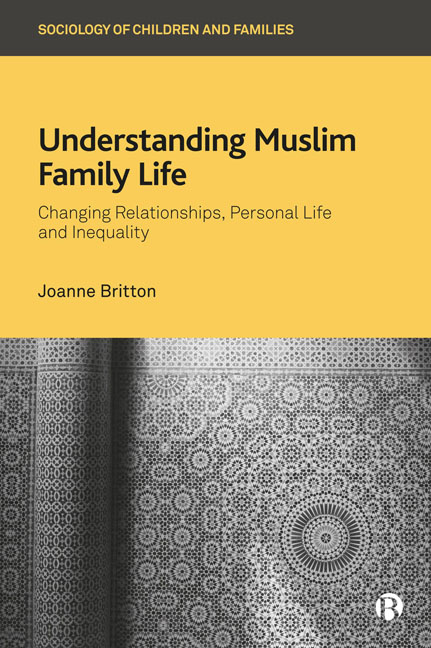Book contents
- Frontmatter
- Contents
- About the Author
- Acknowledgements
- 1 Introduction
- 2 Theorizing Muslim Family Life
- 3 Identity and Belonging: Exploring Intersections
- 4 Changing Perspectives: Muslim Families as ‘a Problem’
- 5 Marriage Practices
- 6 Gender Relations and Diverse Relationship Practices
- 7 Generation and Intergenerational Relations
- 8 Inequality, Disadvantage and Discrimination
- 9 Conclusion
- References
- Index
7 - Generation and Intergenerational Relations
Published online by Cambridge University Press: 19 December 2024
- Frontmatter
- Contents
- About the Author
- Acknowledgements
- 1 Introduction
- 2 Theorizing Muslim Family Life
- 3 Identity and Belonging: Exploring Intersections
- 4 Changing Perspectives: Muslim Families as ‘a Problem’
- 5 Marriage Practices
- 6 Gender Relations and Diverse Relationship Practices
- 7 Generation and Intergenerational Relations
- 8 Inequality, Disadvantage and Discrimination
- 9 Conclusion
- References
- Index
Summary
The life-course is a fluid, ever-changing experience. Family ties and obligations change through the life-course, linked to an age-based chronology. Generational positions involve specific social and moral obligations, role expectations and culturally situated assumptions about behaviour which are integral to identity. Age and generational position shape individual perspectives and agency, intersecting with gender and other dimensions of difference to influence the conduct of family life. This chapter considers how the structure and arrangement of Muslim family life involves multiple relationships comprising different generations. It shows how a comprehensive perspective of changing generational relations can be achieved through considering connections between relational, cultural and structural factors. It adopts a relational approach through focusing on complex dynamics of generational relationships and multiple reciprocal exchanges at the heart of family life. This includes considering how changing generational relationships, roles and responsibilities challenge traditional, hierarchical relationships. It also involves assessing intergenerational transmission of different resources and how degrees of independence, productivity and caring responsibilities influence patterns of generational relationships. A central aim of the chapter is to highlight the importance of caring in the generational domestic division of labour, presenting a case for paying more attention to, usually overlooked, hidden social relations of care in Muslim family life. The chapter demonstrates how exploring inter-generational relationships provides further evidence of enduring marked ambivalence in how family life is represented. In summary, while Muslim families are commonly depicted as family-oriented, intergenerationally cohesive and stable, notions of generational struggle and a rigid generational hierarchy are also shown to feature. Lastly, the chapter further engages with previously discussed core arguments about extended family as a privileged marker of difference for Muslims. Through exploring the relationship between family and household, it critically considers the extent to which a commitment to familism maintains a collectivist orientation to family arrangements.
A relational approach to intergenerationality
Intergenerationality refers to interactions and relationships between people belonging to different generational groupings. It highlights how, for people of all ages, identity is shaped and experienced in relation to others from both the same and other generational groups (Hopkins and Pain, 2008).
- Type
- Chapter
- Information
- Understanding Muslim Family LifeChanging Relationships, Personal Life and Inequality, pp. 97 - 116Publisher: Bristol University PressPrint publication year: 2024

